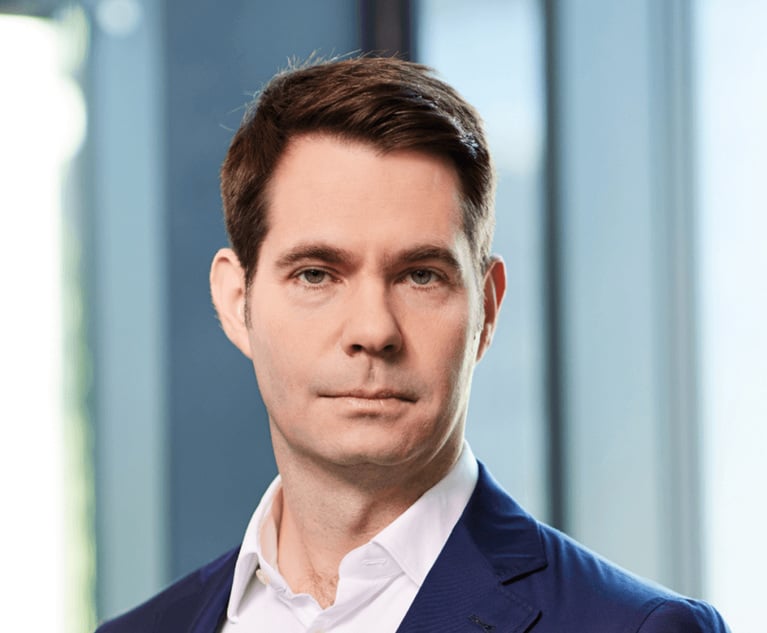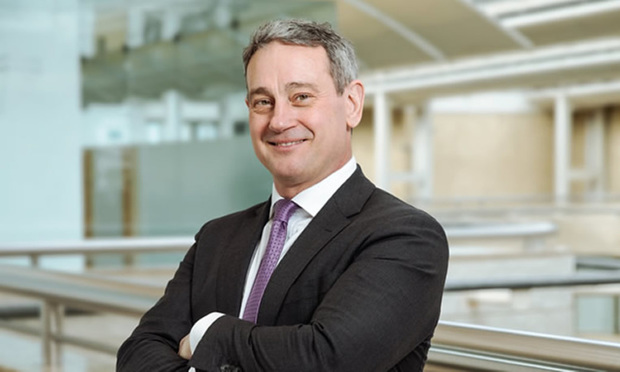'I'm looking forward to being more hands on again' - BT's Dan Fitz on joining The Francis Crick Institute
The former group GC on leaving a team of 500 to head the biomedical research centre's four-strong legal department
August 06, 2018 at 08:28 AM
5 minute read
BT group company secretary and former general counsel Dan Fitz (pictured) is set to leave the organisation to take up a new role at elite biomedical research centre The Francis Crick Institute.
His move, which will take effect from 1 November, ends a more than eight-year career with BT, most of which was spent as group GC before he stepped down in April this year and was replaced by former AB Inbev GC Sabine Chalmers.
With additional heavyweight roles at Cable & Wireless and Misys (now named Finastra) under his belt before joining BT in 2010, the move marks a first step outside listed company work for Fitz, who has been one of the telecoms industry's most high-profile GCs.
The Crick Institute, which opened in 2016 near St Pancras station in London, is a joint project between Cancer Research UK, the Wellcome Trust, the Medical Research Council and three London universities – UCL, Imperial and King's College London.
Speaking about his move, Fitz said: "It will be very different to all my previous jobs in-house – it'll be my first time outside of a PLC environment and in a charity. I'll be doing more IP. Also, I'll need to understand the governance of large charities and of the Crick's large academic founders. It works closely with its founder institutions, with a lot of people and resource sharing – I'll need to get on top of that quickly. "
Fitz will also have to get used to a very different team structure. At BT he headed a team of 500 people across legal, governance and compliance – 275 of whom are qualified lawyers, working within a wider group of 400 people in the legal team.
At the Crick Institute, where he replaces Melanie Chatfield who left the institute earlier this year, he will lead a legal team of four, covering the needs of more than 1,000 people.
While the return to hands-on legal work may be a change, Fitz is undaunted by the challenge.
"I'm looking forward to being more hands on as a lawyer again. At BT I tended to focus on the most important thing of the moment; there were always lots of bright colleagues better able to do the heavy lifting. At the Crick, we'll all be sharing the load. At Misys there was no legal department at all when I joined and I enjoyed getting hands on again, so going back to that will be nice."
While Fitz will be going back to a more hands-on approach at the Crick, he will likely be hoping that he won't have to go back to some of the crisis situations he has had to deal with in past roles.
At BT for example, he oversaw the company's response to a high-profile accounting scandal in its Italian division, and life was not always plain sailing at Misys.
He also took the lead on integration efforts following BT's £12.5bn merger with EE last year.
What is certain is that Fitz appears to have found at the world-leading scientific institution exactly what he was looking for from his next role.
"I have always looked for roles where I can work with bright people whose ethics I don't need to worry about and where my role matters," concludes Fitz. "For this move, I was keen to do something completely different. The Crick offers all of these things."
Quick questions:
What will you miss most about BT? "The people. And the telecoms sector as an industry gets into your blood; I'll now have to settle with being an informed observer."
What have been some of your career highlights at BT? "The acquisition of EE was a big highlight in a positive sense. The other has been the role I have played helping to transform the legal team. When I joined BT there were over 26 disparate legal teams, but by the time I handed over to Sabine we were one unified team on the same budget. The willingness of the business to do that was evidence that they trusted us.
"BT previously had a culture of maximum devolution to all business units and they all had replicated functions like legal and HR. So part of the evolution of the company has been identifying those areas best done once. There were a lot more people before – the legal team has reduced by about 20% during my time – but now there is more diversity and we have more career opportunities for the team; it's easier for people to manage their own careers."
 The Francis Crick Institute Photo credit: Matt Brown
The Francis Crick Institute Photo credit: Matt BrownThis content has been archived. It is available through our partners, LexisNexis® and Bloomberg Law.
To view this content, please continue to their sites.
Not a Lexis Subscriber?
Subscribe Now
Not a Bloomberg Law Subscriber?
Subscribe Now
NOT FOR REPRINT
© 2025 ALM Global, LLC, All Rights Reserved. Request academic re-use from www.copyright.com. All other uses, submit a request to [email protected]. For more information visit Asset & Logo Licensing.
You Might Like
View All

Fidal Launches Disputes Practice; Pinsent’s Paris Arbitration Partner Jumps to Boutique Firm, Plus Other French Moves
5 minute read
Top Labor Lawyer and Former Germany Managing Partner Leaves A&O Shearman to Found Boutique Firm
3 minute read
Noerr’s Former Polish Office Merges With Big Professional Services Firm Eying German-Speaking Clients
3 minute readTrending Stories
- 1Treasury GC Returns to Davis Polk to Co-Chair White-Collar Defense and Investigations Practice
- 2Decision of the Day: JFK to Paris Stowaway's Bail Revocation Explained
- 3Doug Emhoff, Husband of Former VP Harris, Lands at Willkie
- 4LexisNexis Announces Public Availability of Personalized AI Assistant Protégé
- 5Some Thoughts on What It Takes to Connect With Millennial Jurors
Who Got The Work
J. Brugh Lower of Gibbons has entered an appearance for industrial equipment supplier Devco Corporation in a pending trademark infringement lawsuit. The suit, accusing the defendant of selling knock-off Graco products, was filed Dec. 18 in New Jersey District Court by Rivkin Radler on behalf of Graco Inc. and Graco Minnesota. The case, assigned to U.S. District Judge Zahid N. Quraishi, is 3:24-cv-11294, Graco Inc. et al v. Devco Corporation.
Who Got The Work
Rebecca Maller-Stein and Kent A. Yalowitz of Arnold & Porter Kaye Scholer have entered their appearances for Hanaco Venture Capital and its executives, Lior Prosor and David Frankel, in a pending securities lawsuit. The action, filed on Dec. 24 in New York Southern District Court by Zell, Aron & Co. on behalf of Goldeneye Advisors, accuses the defendants of negligently and fraudulently managing the plaintiff's $1 million investment. The case, assigned to U.S. District Judge Vernon S. Broderick, is 1:24-cv-09918, Goldeneye Advisors, LLC v. Hanaco Venture Capital, Ltd. et al.
Who Got The Work
Attorneys from A&O Shearman has stepped in as defense counsel for Toronto-Dominion Bank and other defendants in a pending securities class action. The suit, filed Dec. 11 in New York Southern District Court by Bleichmar Fonti & Auld, accuses the defendants of concealing the bank's 'pervasive' deficiencies in regards to its compliance with the Bank Secrecy Act and the quality of its anti-money laundering controls. The case, assigned to U.S. District Judge Arun Subramanian, is 1:24-cv-09445, Gonzalez v. The Toronto-Dominion Bank et al.
Who Got The Work
Crown Castle International, a Pennsylvania company providing shared communications infrastructure, has turned to Luke D. Wolf of Gordon Rees Scully Mansukhani to fend off a pending breach-of-contract lawsuit. The court action, filed Nov. 25 in Michigan Eastern District Court by Hooper Hathaway PC on behalf of The Town Residences LLC, accuses Crown Castle of failing to transfer approximately $30,000 in utility payments from T-Mobile in breach of a roof-top lease and assignment agreement. The case, assigned to U.S. District Judge Susan K. Declercq, is 2:24-cv-13131, The Town Residences LLC v. T-Mobile US, Inc. et al.
Who Got The Work
Wilfred P. Coronato and Daniel M. Schwartz of McCarter & English have stepped in as defense counsel to Electrolux Home Products Inc. in a pending product liability lawsuit. The court action, filed Nov. 26 in New York Eastern District Court by Poulos Lopiccolo PC and Nagel Rice LLP on behalf of David Stern, alleges that the defendant's refrigerators’ drawers and shelving repeatedly break and fall apart within months after purchase. The case, assigned to U.S. District Judge Joan M. Azrack, is 2:24-cv-08204, Stern v. Electrolux Home Products, Inc.
Featured Firms
Law Offices of Gary Martin Hays & Associates, P.C.
(470) 294-1674
Law Offices of Mark E. Salomone
(857) 444-6468
Smith & Hassler
(713) 739-1250









